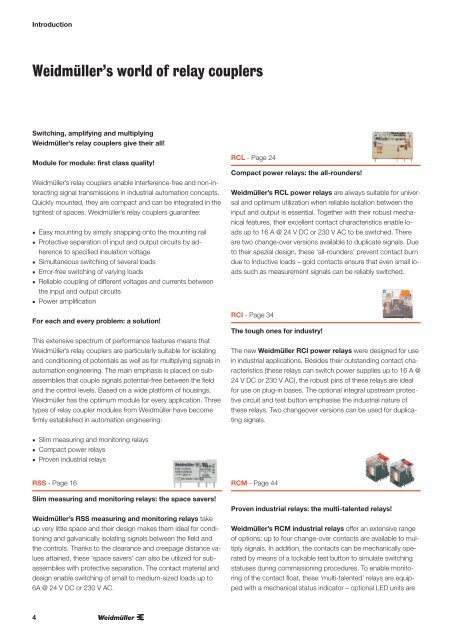Relay couplers MICROSERIES, PLUGSERIES ... - Dyer Technology
Relay couplers MICROSERIES, PLUGSERIES ... - Dyer Technology
Relay couplers MICROSERIES, PLUGSERIES ... - Dyer Technology
You also want an ePaper? Increase the reach of your titles
YUMPU automatically turns print PDFs into web optimized ePapers that Google loves.
Introduction<br />
Weidmüller’s world of relay <strong>couplers</strong><br />
Switching, amplifying and multiplying<br />
Weidmüller’s relay <strong>couplers</strong> give their all!<br />
Module for module: first class quality!<br />
Weidmüller’s relay <strong>couplers</strong> enable interference-free and non-interacting<br />
signal transmissions in industrial automation concepts.<br />
Quickly mounted, they are compact and can be integrated in the<br />
tightest of spaces. Weidmüller’s relay <strong>couplers</strong> guarantee:<br />
� Easy mounting by simply snapping onto the mounting rail<br />
� Protective separation of input and output circuits by adherence<br />
to specified insulation voltage<br />
� Simultaneous switching of several loads<br />
� Error-free switching of varying loads<br />
� Reliable coupling of different voltages and currents between<br />
the input and output circuits<br />
� Power amplification<br />
For each and every problem: a solution!<br />
This extensive spectrum of performance features means that<br />
Weidmüller’s relay <strong>couplers</strong> are particularly suitable for isolating<br />
and conditioning of potentials as well as for multiplying signals in<br />
automation engineering. The main emphasis is placed on subassemblies<br />
that couple signals potential-free between the field<br />
and the control levels. Based on a wide platform of housings,<br />
Weidmüller has the optimum module for every application. Three<br />
types of relay coupler modules from Weidmüller have become<br />
firmly established in automation engineering:<br />
� Slim measuring and monitoring relays<br />
� Compact power relays<br />
� Proven industrial relays<br />
RSS - Page 16<br />
Slim measuring and monitoring relays: the space savers!<br />
Weidmüller’s RSS measuring and monitoring relays take<br />
up very little space and their design makes them ideal for conditioning<br />
and galvanically isolating signals between the field and<br />
the controls. Thanks to the clearance and creepage distance values<br />
attained, these ‘space savers’ can also be utilized for subassemblies<br />
with protective separation. The contact material and<br />
design enable switching of small to medium-sized loads up to<br />
6A @ 24 V DC or 230 V AC.<br />
4<br />
RCL - Page 24<br />
Compact power relays: the all-rounders!<br />
Weidmüller’s RCL power relays are always suitable for universal<br />
and optimum utilization when reliable isolation between the<br />
input and output is essential. Together with their robust mechanical<br />
features, their excellent contact characteristics enable loads<br />
up to 16 A @ 24 V DC or 230 V AC to be switched. There<br />
are two change-over versions available to duplicate signals. Due<br />
to their spezial design, these ‘all-rounders’ prevent contact burn<br />
due to inductive loads – gold contacts ensure that even small loads<br />
such as measurement signals can be reliably switched.<br />
RCI - Page 34<br />
The tough ones for industry!<br />
The new Weidmüller RCI power relays were designed for use<br />
in industrial applications. Besides their outstanding contact characteristics<br />
(these relays can switch power supplies up to 16 A @<br />
24 V DC or 230 V AC), the robust pins of these relays are ideal<br />
for use on plug-in bases. The optional integral upstream protective<br />
circuit and test button emphasise the industrial nature of<br />
these relays. Two changeover versions can be used for duplicating<br />
signals.<br />
RCM - Page 44<br />
Proven industrial relays: the multi-talented relays!<br />
Weidmüller’s RCM industrial relays offer an extensive range<br />
of options: up to four change-over contacts are available to multiply<br />
signals. In addition, the contacts can be mechanically operated<br />
by means of a lockable test button to simulate switching<br />
statuses during commissioning procedures. To enable monitoring<br />
of the contact float, these ‘multi-talented’ relays are equipped<br />
with a mechanical status indicator – optional LED units are


